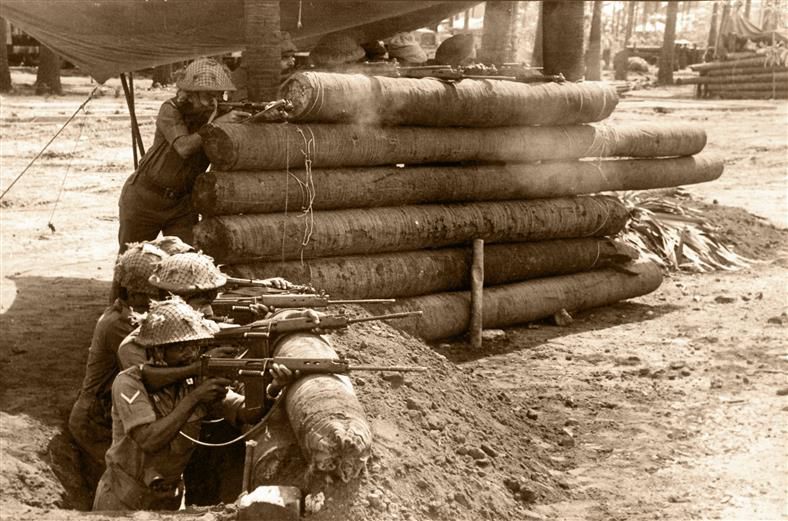IPKF did the job in Sri Lanka despite heavy odds
IT was exactly 37 years ago (July 29, 1987) that the India-Sri Lanka Accord was signed; under its mandate, the Indian Peace-Keeping Force (IPKF) was formed and Operation Pawan was launched. It took the Sri Lankan security forces another two decades to end the civil war.
Last week, the country celebrated 25 years of the Kargil ‘skirmish’, the official term used for the limited campaign that was launched to throw out Pakistani intruders — at an avoidably high cost. The war was fought during the BJP-led government’s term; it exposed major deficiencies in intelligence and higher defence management that triggered off the biggest defence reforms through the Kargil Review Committee report. But India’s first out-of-area force projection, masked as a pacifying force to subdue a deadly guerrilla force (LTTE), has been consigned to oblivion. IPKF veterans have been urging the government for the past few years that they be permitted to ‘officially commemorate’ the sacrifice of 1,172 bravehearts (and 3,000-odd wounded) at the National War Memorial with the authorised panoply of ceremonial honours. Their pleas have fallen on deaf ears; as a former GOC, IPKF (South), I am adding my voice to theirs.
On a visit to Colombo some years ago, I met the then Sri Lankan Army Commander, Gen Hamilton Wanasinghe, who told me: “Your boys did a splendid job. Our task was made easier as you had broken the back of the LTTE despite your mission getting mired in domestic politics of Colombo and New Delhi. Thanks to the IPKF, we managed to defeat LTTE in 2009, even then not without Indian assistance.”
On May 14, 2024, the Ministry of Home Affairs extended by five years the ban on “a disintegrated LTTE”. It is instructive to recall the deeds and dilemma of the IPKF, which, despite a mission-creep mandate and the absence of strategic guidance (armed with a British tourist map), achieved its military and political objectives.
After initial setbacks in Jaffna following LTTE supremo Prabhakaran reneging on the Delhi agreement, the IPKF, which constituted the military component of coercive diplomacy, succeeded in creating a security environment conducive to holding the first-ever provincial as well as parliamentary and presidential elections in the merged northeastern region, enabled by the 13th amendment of the Sri Lankan Constitution. Restoring the democratic process in insurgency-rocked provinces entailed systematic marginalisation of the LTTE, including pushing its members into the jungles. Taking over security duties in the northeast, the IPKF freed the Sri Lankan security forces to eliminate Marxist JVP (Janatha Vimukthi Peramuna) rebels in the south. By degrading the LTTE’s capability and motivation, the IPKF prevented he creation of the Eelam (separate homeland for the Tamils), thereby protecting the territorial integrity and sovereignty of Sri Lanka. All this was done despite the severe handicap of a regime change in Sri Lanka and India. Then President Jayewardene was replaced by Premadasa, who had engineered a secret deal with the LTTE to evict the IPKF. He served a notice on the IPKF to vacate Sri Lanka, a move that was endorsed by then Prime Minister VP Singh, who succeeded Rajiv Gandhi.
This double jeopardy represented a clear failure of coercive diplomacy and political intelligence. But conveniently, the IPKF was made the scapegoat. The Sri Lankan imbroglio required a political antidote, and as PM Narendra Modi recently told Russian President Vladimir Putin: “The solution to any war does not lie on the battlefield”. Op Pawan was the first triservice campaign with a joint command and overall force commander. In their new book on the IPKF, Valiant Deeds – Undying Memories, Col Atul Kochhar and Col Ravi Nair recall the gallantry and bravery of the force. One Param Vir Chakra and Uttam Yudh Seva Medal each, six Maha Vir Chakras and 98 Vir Chakras, besides other medals, were won by the force consisting of four infantry divisions (70,000 personnel) supported by the artillery, a tank regiment, special forces, paramilitary forces, combat helicopters, the IAF and the Navy. A grateful Sri Lanka has raised a war memorial honouring the gallant Indian soldiers who shed their blood for its security.
A group of committed veterans has been waging another battle in the corridors of South Block, calling for recognition of Op Pawan as an honourable and successful military campaign where Indian peacekeepers became peace enforcers. The performance of soldiers is measured by acts of valour and gallantry, which are commemorated regardless of victory or defeat. The British-led campaign in Gallipoli during World War I was an acclaimed fiasco. Yet, Australia and New Zealand (Indian units were also involved) commemorate it on April 25 annually. The US honours its brave soldiers who fought in Vietnam on March 29; Russia, Ukraine and Belarus commemorate the Afghanistan expedition on February 15. And the list goes on. Op Pawan was a military success, even though there was a political and diplomatic failure. In India, the wars of 1971 (liberation of Bangladesh) and 1999 (Kargil) are officially commemorated and celebrated.
IPKF veterans recently wrote to the Service Chiefs and the Minister of State for Defence and have received the reply: “the matter is under consideration”. They want ‘official recognition’ and declaration of July 29 as the date of commemoration, besides an enlisted bugler to play the Last Post in memory of their fallen comrades. Operation Pawan was definitely neither a minor operation nor just a skirmish.









